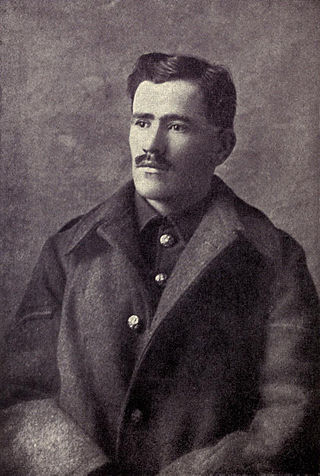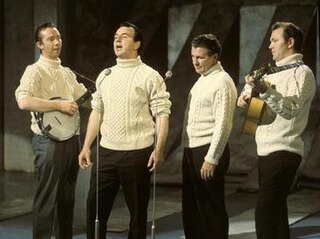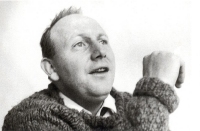Related Research Articles

Francis Edward Ledwidge was a 20th-century Irish poet. From Slane, County Meath, and sometimes known as the "poet of the blackbirds", he was later also known as a First World War war poet. He befriended the established writer Lord Dunsany, who helped with publication of his works. He was killed in action at Ypres in 1917.
Paul Harrington is an Irish musician, who, with Charlie McGettigan, won the Eurovision Song Contest for Ireland in 1994.

Irish music is music that has been created in various genres on the island of Ireland.

The Clancy Brothers were an influential Irish folk music group that developed initially as a part of the American folk music revival. Most popular during the 1960s, they were famed for their Aran jumper sweaters and are widely credited with popularising Irish traditional music in the United States and revitalising it in Ireland, contributing to an Irish folk boom with groups like the Dubliners and the Wolfe Tones.

Liam Clancy was an Irish folk singer from Carrick-on-Suir, County Tipperary. He was the youngest member of the influential folk group the Clancy Brothers, regarded as Ireland's first pop stars. They achieved global sales of millions and appeared in sold-out concerts at such prominent venues as Carnegie Hall and the Royal Albert Hall.

Anúna is a vocal ensemble formed in Ireland in 1987 by Irish composer Michael McGlynn under the name An Uaithne. Taking the current name in 1991, the group has recorded 18 albums and achieved a high level of international success, including a significant role in Riverdance from 1994 to 1996. Almost all of their repertoire is composed or arranged by McGlynn. Despite having been based in Ireland since their foundation and providing training to many Irish singers, McGlynn announced in December 2022 that the group would cease public performance in Ireland, while continuing in Northern Ireland and beyond.

Frank Harte was a traditional Irish singer, song collector, architect and lecturer. He was born in Chapelizod, County Dublin, and raised in Dublin. His father, Peter Harte, who had moved from a farming background in Sligo, owned 'The Tap' pub in Chapelizod.
"The Maid and the Palmer" is an English language medieval murder ballad with supernatural/religious overtones. Because of its dark and sinister lyrics, the song was often avoided by folk singers. Child's main text in English comes from the seventeenth century ballad collection compiled by Thomas Percy, supplemented by a nineteenth century fragment recalled by Sir Walter Scott, although both Child and later scholars agree that the English language version(s) of the ballad derive from an earlier Continental original or "Magdalene ballad" that is based upon a medieval legend associated with Mary Magdalene, in which her story has become conflated with that of the Samaritan woman at the well in the Gospel of John. The ballad was present in oral tradition in Scotland in the early years of the nineteenth century but was subsequently lost there, however versions have since been recovered in Ireland, in particular among the Irish Traveller community, with an intervening gap of some 150 years. A small fragment of the ballad has also been claimed to have been recovered in the U.S.A., but the veracity of this record is disputed. The "palmer" of Child's title, as included the Percy MS version, refers to a pilgrim, normally from Western Europe, who had visited the holy places in Palestine and who, as a token of his visits to the Holy Land, brought back a palm leaf or a palm leaf folded into a cross. In the ballad the palmer, as a holy man, has the ability to see the Magdalene character/protagonist's past in which she has borne and buried numerous children and to prescribe what fate awaits her in the hereafter, in the form of a set of seven year penances following which she will be absolved from her sins; in Continental versions, and in one variant collected in Ireland, the palmer is in fact Jesus.

Mícheál Ó Domhnaill was an Irish singer, guitarist, composer, and producer who was a major influence on Irish traditional music in the second half of the twentieth century. He is remembered for his innovative work with Skara Brae, the first group to record vocal harmonization in Irish language songs, and The Bothy Band, one of the most influential groups in Irish traditional music. His reputation was enhanced by a successful collaboration with master fiddler Kevin Burke, and his work with the Celtic groups Relativity and Nightnoise, which achieved significant commercial and critical acclaim.

Sarah Makem a native of Keady, County Armagh, Northern Ireland, was a traditional Irish singer. She was the wife of fiddler Peter Makem, mother of musicians Tommy Makem and Jack Makem, and grandmother of musicians Tom Sweeney, Jimmy Sweeney, Shane Makem, Conor Makem and Rory Makem. Sarah Makem and her cousin, Annie Jane Kelly, were members of the Singing Greenes of Keady.
Liam Weldon was a singer and songwriter in the Irish folk tradition.

Irish traditional music is a genre of folk music that developed in Ireland.
Celtic Thunder is an Irish singing group and stage show known for its eclectic, theatrical style show. The group is backed by the Celtic Thunder Band on their concert tours, and their live shows are known for the use of dramatic set pieces, visual effects, and highly choreographed staging.

Sean-nós singing is unaccompanied traditional Irish vocal music usually performed in the Irish language. Sean-nós singing usually involves very long melodic phrases with highly ornamented and melismatic melodic lines, differing greatly from traditional folk singing elsewhere in Ireland, although there is significant regional variation within Ireland. Sean-nós songs cover a range of genres, from love song to lament to lullaby, traditionally with a strong focus on conveying the relevant emotion of the given song. The term sean-nós, which simply means "in the old way", is a vague term that can also refer to various other traditional activities, musical and non-musical.
Dan Milner is a singer of traditional Irish songs, a scholar-teacher and a writer. Born Daniel Michael Milner on March 27, 1945 in Birmingham, England to an Irish mother, Nora Mary Cremin of Brosna, Co. Kerry, and an Irish-English father, Willam Milner, he is the younger brother of Liam Donal Padraig Milner (1940-2008), who was also a fine singer. The Milner family moved frequently following World War II, the result being the brothers grew up in far-flung localities including Birmingham, Ballybunion, Co. Kerry, Toronto, Canada and Brooklyn, New York.

Robbie O'Connell is an Irish singer songwriter who performs solo, as well as with The Green Fields of America. He also appears with Dónal Clancy (cousin), Dan Milner, and fiddler Rose Clancy. O'Connell has also toured and recorded with The Clancy Brothers, being their nephew. For over 20 years, he has conducted small cultural tours to Ireland with Celtica Music & Tours and, for more than ten years, WGBH Learning Tours. Married with four grown children, he now spends his time between Bristol, Rhode Island and Waterford.
"Foggy Dew" is the name of several Irish ballads, and of an Irish lament. The song chronicles the Easter Rising of 1916, and encourages Irishmen to fight for the cause of Ireland, rather than for the British Empire, as so many young men were doing in World War I.

Finbarr Clancy is an Irish folk singer and multi-instrumentalist. Early in his career he performed with The Clancy Brothers. He later became a member of the group The High Kings.

Colm Keegan is a singer, songwriter and teacher from Dublin, Ireland. He was formerly a principal singer with Irish music group, Celtic Thunder, as well as previously performing with the likes of Celtic Woman, The Priests, and Irish tenor Peter Corry. He released his first solo album "I'll Never Be Alone" in the fall of 2016. He is currently touring with his wife, Laura, on various solo tours.
References
- ↑ International Chef Robbie Dunn cooks up a storm at Kedron-Wavell, accessed 4 July 2011.
- ↑ The Eyes Have It, accessed 4 July 2011.
- ↑ Robbie Dunn: An Irishman in Brisbane, accessed 4 July 2011
- ↑ ABC Radio Interview, accessed 4 July 2011
- 1 2 3 Robbie Dunn: Jango Radio, accessed 4 July 2011